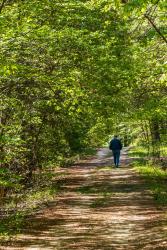How is ŌĆślock-downŌĆÖ affecting our use of green-spaces?
 Many of us have appreciated our local access to green spaces during 'lock-down'.We know that access to green spaces and to nature can affect our mood and even our mental health and well-being. The on-going ŌĆślock-downŌĆÖ restrictions have changed that access. What effect will this have on our wellbeing? And what can this tell us about the importance of such access and the experiences of different socio-economic groups?
Many of us have appreciated our local access to green spaces during 'lock-down'.We know that access to green spaces and to nature can affect our mood and even our mental health and well-being. The on-going ŌĆślock-downŌĆÖ restrictions have changed that access. What effect will this have on our wellbeing? And what can this tell us about the importance of such access and the experiences of different socio-economic groups?
┬ķČ╣┤½├ĮĖ▀ŪÕ░µŌĆÖs School of Natural Sciences have been awarded funding from the UKŌĆÖs Economic and Society Research Council to answer some of these questions.
Rachel Dolan, a PhD student in the school, was already working on the use of green space in Wales and how this varied with geographic and socio-demographic variables. In January she conducted a survey with a representative sample of 1,000 people in Wales.
Rachel Dolan says:
ŌĆ£We know that spending time outside in green spaces such as gardens, parks, beaches or woodlands is really important for wellbeing. However, not everybody is able to access green spaces in the same way. Access depends on where you live but other social and economic factors such as money are also very important; better-off people might be able to easily get to green spaces regardless of where they live for example.ŌĆØ
Julia Jones, Professor of Conservation Science at ┬ķČ╣┤½├ĮĖ▀ŪÕ░µ who is leading the new project says:
ŌĆ£PeopleŌĆÖs experiences over the last few months with Covid-19 have really emphasized how important getting outside is. The recommendations across all parts of the UK encouraged outside exercise, whereas in some countries this was severely curtailed.
I have certainly found that spending time in nature has been invaluable during these strange times.ŌĆØ
Simon Willcock, Senior Lecturer in Environmental Geography adds:
ŌĆ£We want to see how peopleŌĆÖs interactions with the natural world may have changed since lock down was brought in. Are people maybe exploring places closer to home more often? Are people just staying in their gardens? What about people who donŌĆÖt have a garden? How do changes in access make people feel? How does all this vary based on where people live and those all-important social and economic factors?ŌĆØ
The ultimate aim of the research is to provide valuable insights which can inform policy at the local and national levels.
The research is funded by the Economic and Social Research Council, the Drapers Company, ┬ķČ╣┤½├ĮĖ▀ŪÕ░µ and the UK Centre for Ecology and Hydrology, and should be completed by September 2021.




